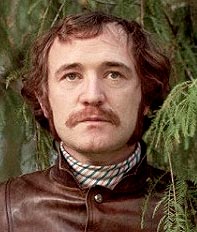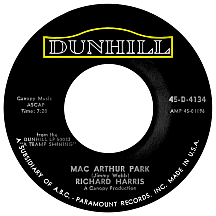RICHARD HARRIS
Mac Arthur Park
Up-and-coming songwriter Jimmy Webb had one of his compositions recorded in 1965, little more than a year after his family moved to San Bernardino, California from the small town of Elk City, Oklahoma. The title was "My Christmas Tree" and The Supremes were the singers. Jimmy was 19 at the time. Over the next couple of years, he penned major hits for The 5th Dimension (the Grammy-winning "Up - Up and Away") and breakout country singer Glen Campbell. Webb's most infamous song, by consensus, walloped the public's eardrums as a seven-minute-plus epic sung by a hard-drinking, wild-living four leaf clover-carrying actor with an unconventional singing style and a tendency towards vulgar behavior. The song itself was quite a grandiose exercise in excess, enjoyed by many, criticized by many more, named after a place adjacent to Wilshire Boulevard in Los Angeles: MacArthur Park, where strangely artistic sightings were apparently common...a favorite spot where Jimmy fell in and out of love and wrote about it, rather abstractly so.
Jimmy met Richard Harris in L.A. at a celebrity anti-war gathering and the two hit it off, the young songsmith at just the point in his life where a commanding presence such as Harris's appealed to his desire to do the things "real men do." So Richard taught him how to drink, that is, really tie one on, and in one such judgment-impaired situation the two decided to make a record together. Harris, born in Limerick, Ireland in 1930, had already made quite a mark as an actor, though the passion of his youth had been to play rugby, a sport he likely would have excelled in had he not contracted tuberculosis. Placing his aspirations squarely on the dramatic stage, he began learning his craft at the London Academy of Music and Dramatic Art, then spent most of the 1950s in various stage productions, followed by a few 1958 television appearances (in The Iron Harp and Rest in Violence, both U.K. dramatic presentations for ITV, and The Hasty Heart, an installment of U.S. series The DuPont Show of the Month on CBS). Shake Hands With the Devil kicked off his movie career in 1959, while big budget early-'60s American films like The Guns of Navarone and Mutiny on the Bounty raised his profle with audiences worldwide.
Harris received his first Oscar nomination with a role close to his heart, portraying a rugby player in the 1963 drama This Sporting Life. In the fall of 1967 he headlined the film version of Camelot in the role of a singing King Arthur (made famous by Richard Burton in the 1960 Broadway original). The soundtrack album had a respectable chart run in the early months of '68 and his singing voice on popular Frederick Loewe-Alan Jay Lerner songs like "How to Handle a Woman" and "I Wonder What the King is Doing Tonight" came off rather well but gave no hint as to the direction he would take months later, his bloated ego having convinced him he would soon rule the record roost and set the non-medieval music world ablaze!
The mad plan of working together on a full album of pop songs was more Richard's idea than Jimmy's; still, the 21-year-old songwriter made the trek to Merry Olde England to co-create what became A Tramp Shining (with music and vocal parts pieced together from recordings made on both sides of the pond); he penned every selection and "Mac Arthur Park," at seven minutes and 20 seconds, stood as the album's centerpiece. Originally offered to The Association, who turned it down, the multi-layered track has three distinct sections (very much like different songs, one of them a spectacular orchestral instrumental) and baffling lyrics ('...pressed in love's hot fevered iron like a stripe-ed pair of pants'), including a descriptively sticky mess ('MacArthur's Park is melting in the dark, all the sweet green icing flowing down...someone left the cake out in the rain...'), in addition to a middle set of verses more conventionally romantic ('After all the loves of my life, you'll still be the one'). Some critics were positively mortified by the end result!

Webb has said he wrote it (along with "By the Time I Get to Phoenix," which had already been a hit for Campbell in late '67) about a woman he loved (and later left) and often spent time with near the actual MacArthur Park, adding that the unusual images described in the song aren't really so strange, but things he observed...all real! Even the soggy cake mess! Richard became obsessed with the song while Jimmy had serious reservations as to its artistic merit. The vocals for the Tramp project were committed to tape between Mr. Harris's drunken sprees (he had a fondness for Pimm's Cups, inebriately popular in England but practically unheard-of in the States, keeping gallons on hand in the recording studio)...and he was never able to say 'Mac Arthur' correctly (it isn't plural...or possessive!). Webb refused to allow the finished take to be released in an edited version, insisting it go out as a full 7:20 single, almost certain to kill its chances (which was, maybe, Jim's intention). So of course it became a smash hit in June 1968, his greatest success to that time, reaching number two in the U.S. and going almost as high on the charts in King Arthur's homeland.
The critical jabs didn't hinder the popularity of the single or album, nor did they prevent the song from winning a Grammy Award for Webb in the category Best Arrangement Accompanying Vocalist. Inspired by this lengthy excess, The Beatles even threw caution to the wind during their recording that summer of "Hey Jude," letting it run over seven minutes and issuing it that way on the first Apple label single. The challenge for Harris and Webb, meanwhile, was whether they could repeat the feat, and try they did. "The Yard Went on Forever," produced with another large orchestra and with its own set of odd lyrics ('The women of Pompeii...standing with the Kansas City/Nagasaki housewives...' ), ran over five-and-a-half minutes, though this title track for the quickly-conceived follow-up album stalled low on the charts near the end of the year. By the summer of '69 it was decided the flip side of "Mac Arthur Park," "Didn't We," had better hit potential and it was reissued with minor results.
The music-making pair later let their friendship lapse, Jimmy figuring he was better off for the worldly experience. Richard's stellar film career rolled on; 1970's A Man Called Horse was so popular that two sequels were made and 1990's The Field brought a second Oscar nomination, with plenty of box office action in between and afterwards. He continued making records post-Webb, scoring his second biggest hit with "My Boy" in early 1972 (though Elvis had a bigger hit with it three years later) and indulging his dramatic side on disc with spoken word albums Jonathan Livingston Seagull in 1973 and The Prophet by Kahlil Gibran in '74.
As for "Mac Arthur Park," what did those critics know, anyway? The song has far surpassed initial expectations (which were next to nil). Waylon Jennings and the Kimberlys did a country version in 1969 that, like the original, won a Grammy. When Motown's Four Tops tackled the tune, the typically elongated recording was spread out over two sides, with part two making the top 40 in the fall of 1971. The biggest surprise came in 1978, when disco queen Donna Summer took her remake to number one...thus, Richard Harris's classic recording isn't even the biggest hit version! But it remains a wildly wonderful musical creation with a permanent place in pop culture. Jimmy Webb has since embraced his elaborately famous production and even performed it live in concert at - where else? - MacArthur Park.


